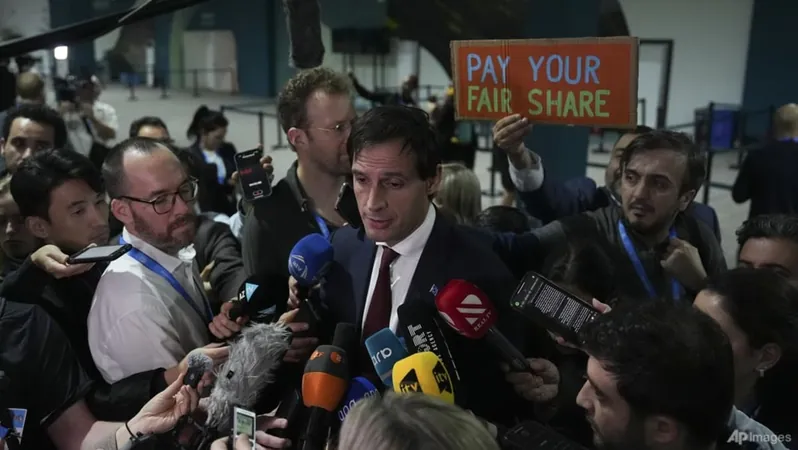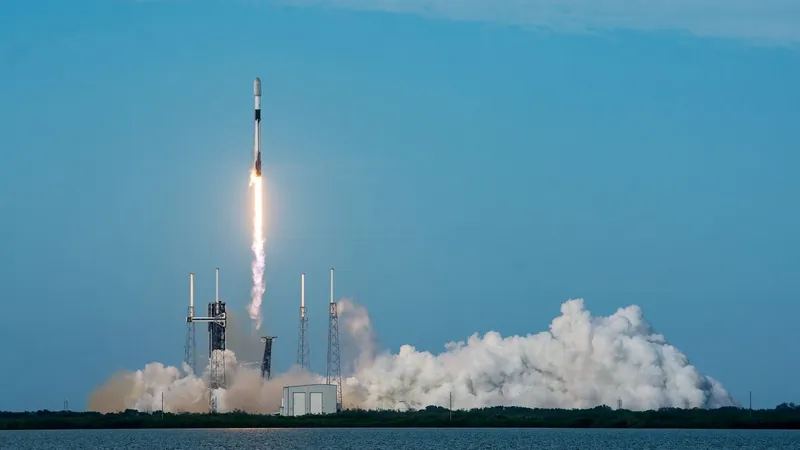
Developing Nations Reject US$300 Billion COP29 Climate Deal as Grossly Inadequate
2024-11-24
Author: Sarah
BAKU:
At the COP29 summit held in Baku, delegates from across the globe reached an agreement on a proposed US$300 billion funding target to assist developing nations grappling with the devastating effects of climate change. However, this agreement has faced strong backlash from its intended beneficiaries, who argue that the funding is grossly inadequate.
The deal, finalized after grueling negotiations that extended beyond the scheduled timeframe, sought to invigorate global efforts to combat climate change during what is projected to be the hottest year on record. While some representatives in the COP29 plenary session applauded the deal's completion, others harshly criticized affluent nations for not stepping up their commitments, and condemned Azerbaijan, the host country, for hastily pushing through the controversial plan.
Chandni Raina, representative of the Indian delegation, expressed her disappointment at the agreement. "I regret to say that this document is nothing more than an optical illusion. This, in our opinion, will not address the enormity of the challenge we all face," she stated.
In contrast, United Nations climate chief Simon Steill recognized the intense negotiations that led to the agreement but described it as an "insurance policy for humanity." "This journey has been difficult, but we've delivered a deal. This deal will fuel the clean energy boom and protect billions of lives. However, like any insurance policy, it only works if the premiums are paid in full and on time," Steill cautioned.
This new commitment supersedes the previous pledge from wealthy nations to deliver US$100 billion annually in climate finance—an agreement that was only reached two years behind schedule in 2022 and is set to expire in 2025. The summit also laid the groundwork for next year's crucial climate summit, which will be held in the Amazon rainforest of Brazil, aiming to craft a comprehensive climate action plan for the next decade.
The negotiations illuminated the stark financial discrepancies between industrialized countries—who historically contributed the most to greenhouse gas emissions—and developing nations that suffer the harsh repercussions of climate change. Delegates from nearly 200 nations had to navigate contentious discussions, extending negotiations well beyond their planned conclusion date. Frustrations boiled over when representatives from some developing and island nations walked out during the talks.
"We leave this summit with only a fraction of the funding that climate-vulnerable countries so urgently need. While this amount is still far from sufficient, it is a starting point," remarked Tina Stege, the climate envoy for the Marshall Islands.
As nations struggle to meet the Paris Agreement's ambitious target of limiting global temperature rises to 1.5 degrees Celsius above preindustrial levels—beyond which climate-related disasters become increasingly likely—the urgency for substantial financial backing has never been clearer. Unfortunately, according to the 2024 UN Emissions Gap report, the world is alarmingly on track for a staggering 3.1 degrees Celsius increase by the end of the century, primarily due to rising greenhouse gas emissions and fossil fuel consumption.
UN Secretary-General Antonio Guterres expressed his disappointment with the COP29 deal; however, he acknowledged that it serves as a foundation upon which more ambitious future agreements can be built.
Is the Global Climate Finance Model Broken?
The list of countries required to contribute to climate finance totals around two dozen industrialized nations, including the US, various European countries, and Canada—a designation established during UN climate negotiations back in 1992. European nations are pushing for other nations, including China and oil-rich Gulf states, to step up their contributions. While developing countries have the option to contribute, they are not obligated to do so under the current agreement.
Moreover, a determined goal to generate US$1.3 trillion in climate finance annually by 2035 has been set—an amount deemed essential by economists to effectively address global warming. The agreement also introduces rules for a global carbon credit market, a mechanism that advocates say could draw in billions of dollars for innovative projects aimed at tackling climate change through initiatives like reforestation and clean energy technologies.
Despite the deal's purported successes, the negotiation process was hindered by political uncertainties, including skepticism surrounding the incoming US administration under Donald Trump, who has previously dismissed climate change as a hoax. This has led negotiators to question whether the world's largest economy would support and contribute to any climate finance agreements made in Baku.
Further complicating matters, geopolitical tensions, including ongoing conflicts such as Russia's war in Ukraine and rising inflation, have sidelined climate policies in many Western governments' priorities. This year's negotiations coincided with scientists' warnings of unprecedented climate extremes, with severe flooding claiming lives across Africa, lethal landslides wreaking havoc in Asia, and droughts in South America decimating river ecosystems.
Developed nations are not immune from climate-induced disasters, either. Spain recently suffered catastrophic flooding resulting in over 200 fatalities, and the US has experienced 24 billion-dollar weather-related disasters this year alone, showing that climate change poses risks that transcend borders and affect wealthy nations as well.
As the world stands at a crucial crossroads, the question remains: will this US$300 billion deal be a meaningful stepping stone towards real climate action, or just another false promise? The clock is ticking, and nations must confront the challenges ahead with urgency and accountability.



 Brasil (PT)
Brasil (PT)
 Canada (EN)
Canada (EN)
 Chile (ES)
Chile (ES)
 España (ES)
España (ES)
 France (FR)
France (FR)
 Hong Kong (EN)
Hong Kong (EN)
 Italia (IT)
Italia (IT)
 日本 (JA)
日本 (JA)
 Magyarország (HU)
Magyarország (HU)
 Norge (NO)
Norge (NO)
 Polska (PL)
Polska (PL)
 Schweiz (DE)
Schweiz (DE)
 Singapore (EN)
Singapore (EN)
 Sverige (SV)
Sverige (SV)
 Suomi (FI)
Suomi (FI)
 Türkiye (TR)
Türkiye (TR)